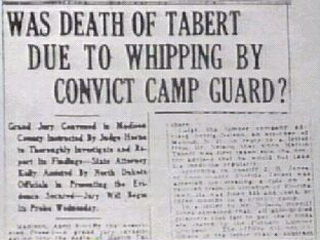1921
INMATE POPULATION DECEMBER 31, 1921: 1,366
The following population information was reported in the Sixteenth Biennial Prison Report, 1919-20:
| 19 State Road Camps on January 1, 1921 | ||
| SRD Camp # | City and County | # Prisoners |
| 1 | Altha, Calhoun County | 34 |
| 2 | Hilliard, Nassau County | 35 |
| 3 | Ponce de Leon, Holmes County | 35 |
| 4 | Cleveland, DeSoto County | 29 |
| 5 | MacClenny, Baker County | 36 |
| 6 | Sanderson, Baker County | 35 |
| 7 | White Springs, Hamilton County | 38 |
| 8 | Jennings, Hamilton County | 42 |
| 9 | Hague, Alachua County | 29 |
| 10 | Watertown, Columbia County | 40 |
| 12 | Suwannee Valley, Columbia County | 38 |
| 14 | Bishopville, Volusia County | 38 |
| 15 | Crescent City, Putnam County | 36 |
| 16 | Midway, Gadsden County | 28 |
| 18 | Parrish, Manatee County | 23 |
| 19 | Bunnell, Flagler County | 37 |
| 22 | Panama City, Bay County | 21 |
| 23 | Istachatta, Hernando County | 25 |
| 24 | Zellwood, Lake County | 29 |
| Total Road Camp Inmates | 628 | |
The brutal side of the convict lease system led to its downfall with a case that brought national attention to Florida. Martin Tabert, a North Dakota resident, is arrested for hopping a freight train and is incarcerated in Leon County for vagrancy.

Martin Tabert (Photo courtesy of FPC.)
According to an article reprinted in the Panama City News Herald in June 2001, this is how Tabert's story unfolds.
MARTIN TABERT'S BRUTAL DEATH LEADS TO
END OF CONVICT LEASE SYSTEM
"(Tabert) was ordered to pay $25 or spend three months at hard labor. Tabert immediately wired his family who sent the $25 plus an additional $25 so he could return home. But through mishandling, the Leon County court never received the money.
Although prisoners sentenced to a year or more of labor were usually sent to the convict camps, a guard whisked Tabert away to the tiny community of Clara in Dixie County, 60 miles south of Tallahassee. He was assigned to the foreign-run Putnam Lumber Co.
At this camp, Tabert labored in the swamps cutting and clearing timber. He soon suffered from fevers, headaches and oozing sores. When he could no longer remain in the woods, Walter Higginbotham, the whipping boss, propped him up on his swollen feet and flogged him about 50 times with a 5-foot leather strap because Tabert failed to do his day's work.
Tabert begged for mercy, but he was so weak he could hardly talk. While he lay in his bunk unconscious, the company doctor examined him and left quinine, for what he diagnosed as "pernicious malaria." But Tabert died a little after 8 p.m. that night.
The Panama City Pilot detailed his story and death on Feb. 2, 1922, headlining the article as "Florida's disgrace."
Tabert's family brought the death of their son to the attention of those in charge in Tallahassee. Newspapers all over the country covered the story. Higginbotham was tried for first-degree murder, but acquitted.
As a result of Tabert's death, Governor Cary Hardee signed bills which forbid the flogging of prisoners and outlawed the convict leasing system in Florida. The leasing system was not completely abolished until 1923.

Martin Tabert was arrested in 1921 for riding a train without a ticket.

Martin Tabert newspaper story.

Convict Lease Labor Camp
- 1821-1845
- 1868-1876
- 1877-1895
- 1900-1919
- 1921
- 1922-1924
- 1927
- 1928-1931
- 1932 | CHAPMAN
- 1933-1935
- 1936-1939
- 1940-1945
- 1946-1949
- 1950-1955
- 1956-1961
- 1962 | WAINWRIGHT
- 1963-1965
- 1966-1969
- 1970-1975
- 1976-1979
- 1980-1986
- 1987 | DUGGER
- 1988-1990
- 1991 | SINGLETARY
- 1992-1995
- 1996-1998
- 1999 | MOORE
- 2000-2002
- 2003 | CROSBY
- 2004-2005
- 2006 | MCDONOUGH
- 2007
- 2008 | MCNEIL
- 2009-2010
- 2011 | BUSS
- 2011 | TUCKER
- 2012 | CREWS
- 2013-2014
- 2014 | JONES
- 2015-2018
- 2019 | INCH
- 2020-2021
- 2021 | DIXON
- 2022-Today
- Population Summary Table

